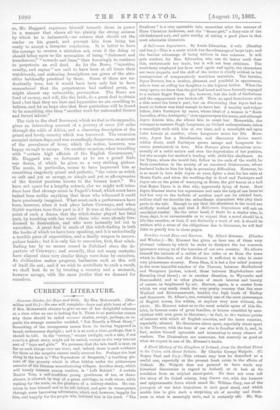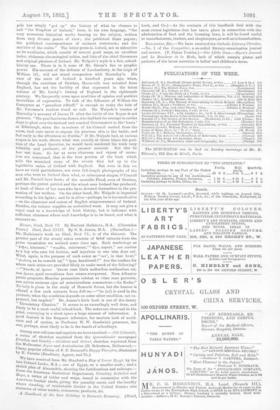A Short History of the Kingdom of Ireland, from the
Earliest Times to the Union with Great Britain. By Charles George Walpole. (C. Kogan Paul and Co.)—This volume may best be described as a useful one, especially at the present fresh crisis in the affairs of Ireland, Mr. Walpole does not pretend to have made any historical discoveries in regard to Ireland, or to look at its condition from an original stand-point. He does not even tell the' story of its linked misery, long drawn out, with the humour and epigrammatic force whioh stand Mr. William Cory, one of the youngest of our later historians, in such good stead, and which enable him to give such a surprising air of novelty and fresh- ness to what is seemingly stale, and is certainly old. Mr. Wal- pole has simply "got up" the history of what he chooses to call "the Kingdom of Ireland," from, in his own language, "the very numerous historical works bearing on the subject, written from very diverse points of view ; the published State papers; the published correspondence of eminent statesmen ; and the statutes of the realm." The letter-press is, indeed, not so attractive as its auxiliaries, which consist of several good maps, an excellent index, elaborate chronological tables, and lists of the chief Governors and original planters of Ireland. Mr. Walpole's style is a fair, school- history one. There is in it none of Mr. Green's fire or graphic power. His account of the defence of Londonderry, in the reign of William III., will not stand comparison with Macaulay's. His view of the state of Ireland a hundred years ago, when, through the exertions of Grattan, Home.rule was extorted from England, he not the lucidity of that expressed in the latest 'volume of Mr. Lecky's history of England in the eighteenth century. We frequently come upon crudities of opinion and positive brutalities of expression. To talk of the followers of William the Conqueror as "penniless riffraff," is enough to make the hair of Mr. Freeman's readers stand on end. Mr. Walpole's version of Macaulay's account of James IL after the battle of the Boyne is not pleasant. "The pusillanimous James, who had had the courage in earlier days to gloat over the bruised and crushed Covenanters in the 'boots' at Edinburgh, when the in embers of his Council rushed from the room, took care never to expose his precioue skin in the battle, and fled early in the afternoon to Dublin," If Mr. Walpole had, at various stages in his work, shown what was exactly at these times the posi- tion of the Land Question, he would have rendered his work very valuable and pertinent, at the present moment. But this he has not done. So far as mere clearness and vigour of narra- tive are concerned, that is the best portion of the book which tells the wretched story of the events that led up to the legislative union of Ireland with England. Bub even in this we have no vivid portraitures, not even full-length photographs of the men who were to Ireland then what, at subsequent stages, O'Connell and Mr. Parnell have been ; of the unstable Flood, even of Grattan, perhaps the purest patriot and the wisest man Ireland has produced, at least of those of her eons who have devoted themselves to the pro- motion of her welfare. On the other hand, Mr. Walpole is impartial according to his lights ; and he is alive—perhaps, he is too much alive --to the character and extent of English misgovernment of Ireland. Besides, the volume supplies an undoubted want. It may not give a royal road to a knowledge of Irish history, but it indicates with sufficient clearness where such knowledge is to be found, and what it amounts to.































 Previous page
Previous page